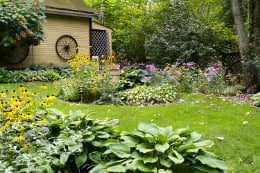 If you’ve ever tried to research the benefits of a grass seed lawn, you will quickly find that there is heated debate about its virtues. Some people are adamant that lawns are a waste of water and nutrients, often indirectly polluting the environment with the overload of fertilizers, herbicides, and other toxic materials that lawn owners frequently apply. Other people are just as sure that lawns help prevent erosion, influence cooler temperatures, and reduce water runoff, as well as give a priceless aesthetic quality to the area. So, who is right? The lawn lovers, or the lawn haters?
If you’ve ever tried to research the benefits of a grass seed lawn, you will quickly find that there is heated debate about its virtues. Some people are adamant that lawns are a waste of water and nutrients, often indirectly polluting the environment with the overload of fertilizers, herbicides, and other toxic materials that lawn owners frequently apply. Other people are just as sure that lawns help prevent erosion, influence cooler temperatures, and reduce water runoff, as well as give a priceless aesthetic quality to the area. So, who is right? The lawn lovers, or the lawn haters?
The answer is both. While lawns do have tremendous environmental benefits, they can also waste or pollute precious environmental resources, if the lawn owner is not aware or careful. The key is to find the right balance between lawn and landscaping, and to use the resources you have wisely. Here are some steps to get you started.
First, try not to grow a lawn in areas where it will struggle. Most grasses prefer full sunlight and flat surfaces. If you are trying to grow grass in the shade of a tree or on the slope of a hill, make sure you find the right grass species or you will put more time, energy, and resources into maintaining those areas.
Second, decide how much lawn area you really need. Do you have a dog that needs a wide expanse of lawn to exercise in? Or kids that will feel cooped up in a yard that is too small for a soccer game? Those are good reasons to keep your lawn area big. But if you have a large lawn and never use it, then you are wasting valuable resources that could be put to better use. Don’t avoid the problem just because you inherited a big yard and don’t know what to do with it. You can start out small in your landscaping, and gradually make your lawn space smaller.

Last, try to incorporate more organic methods into your lawn care. Most chemical products applied to lawns have the benefit of producing fast results, but they often have the downside of leaving harmful byproducts in the soil and groundwater. Help your lawn to become more self-sustaining. Grass-cycling, for example, will reduce a grass seed lawn’s fertilizer needs by 25%. Try an organic fertilizer, or begin a compost pile so that you can create your own fertilizer. Pull weeds early on, instead of using an herbicide to control them. Use corn gluten as a natural preemergence herbicide. And if you do use synthetic products, make sure that you apply the correct amounts as instructed. Doing all of these things will help keep your lawn and the planet healthy.


